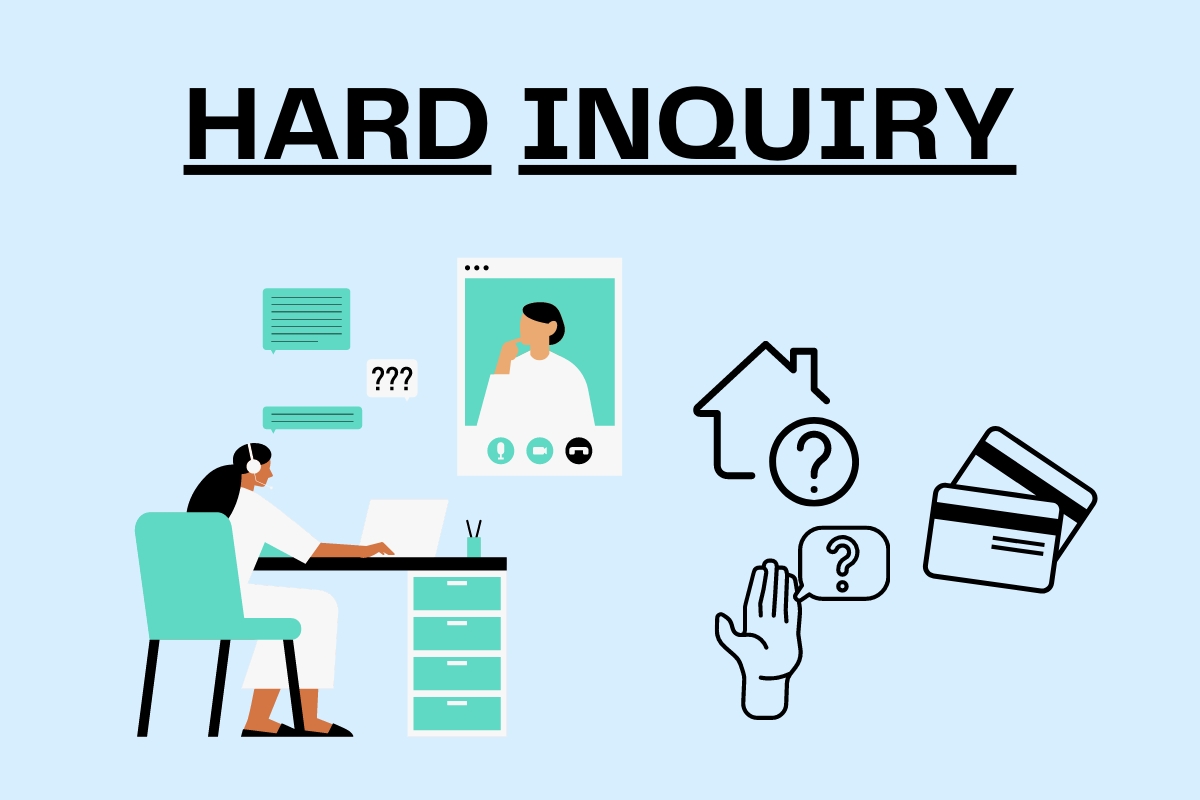Home>Finance>Will My Credit Score Go Up When Hard Inquiries Fall Off


Finance
Will My Credit Score Go Up When Hard Inquiries Fall Off
Modified: March 6, 2024
Find out how hard inquiries and falling off your credit report can impact your credit score. Discover if your finance goals will be affected and if your credit score will go up.
(Many of the links in this article redirect to a specific reviewed product. Your purchase of these products through affiliate links helps to generate commission for LiveWell, at no extra cost. Learn more)
Table of Contents
Introduction
When it comes to managing your finances, your credit score plays a crucial role. It’s a three-digit number that lenders use to assess your creditworthiness and determine whether to approve your loan application. Maintaining a good credit score is essential for obtaining favorable interest rates and securing financial opportunities.
One factor that can impact your credit score is hard inquiries. These occur when a lender or creditor pulls your credit report in response to your credit application. Hard inquiries are typically made when you apply for a new credit card, a mortgage, or a car loan. While they are a necessary part of the credit evaluation process, you may wonder how they affect your credit score and whether it will go up when hard inquiries fall off.
In this article, we will delve into the intricacies of hard inquiries and explore their impact on your credit score. We will also address the question of whether your credit score will go up when hard inquiries fall off your credit report. Understanding these factors can help you make informed financial decisions and take steps to improve your creditworthiness.
Understanding Hard Inquiries
Before we dive into how hard inquiries impact your credit score, it’s important to understand what they are. A hard inquiry, also known as a hard pull or hard credit check, occurs when a lender or creditor accesses your credit report to evaluate your creditworthiness. It is typically initiated when you apply for a new credit card, a loan, or a line of credit.
Hard inquiries are different from soft inquiries, which occur when you check your own credit report or when a lender checks your credit as part of a promotional or pre-approved offer. Soft inquiries do not impact your credit score, while hard inquiries can have an effect.
When a hard inquiry is made, it is recorded on your credit report and can remain there for a certain period of time. Multiple hard inquiries within a short timeframe can signal to lenders that you are seeking credit and may pose a higher risk. This is why it’s important to understand how hard inquiries can impact your credit score.
It’s worth noting that not all hard inquiries are equal. Some hard inquiries, such as those associated with applying for a mortgage or a car loan, are generally considered normal and expected. On the other hand, a series of hard inquiries for new credit cards in a short period of time may be viewed more negatively by lenders.
Now that we have a clearer understanding of what hard inquiries are, let’s explore how they can affect your credit score.
How Hard Inquiries Impact Your Credit Score
Hard inquiries can have an impact on your credit score, albeit a temporary one. When a lender or creditor pulls your credit report to assess your creditworthiness, it signifies that you are actively seeking new credit. This activity can contribute to a slight decrease in your credit score.
On average, a single hard inquiry can cause your credit score to drop by a few points. However, the impact is typically minimal and short-lived. In most cases, the decrease in your credit score from a hard inquiry is temporary and will gradually diminish over time.
It’s important to note that the impact of hard inquiries on your credit score may vary depending on your overall credit history. For individuals with a long and positive credit history, the effect of a single hard inquiry is likely to be less significant compared to someone with a shorter credit history or a few negative marks on their credit report.
Additionally, credit scoring models take into account the “shopping around” behavior of consumers when it comes to certain types of loans, such as mortgages or car loans. They understand that consumers may need to apply with multiple lenders to find the best terms and rates. As a result, multiple inquiries for the same type of loan within a specific timeframe (typically around 14-45 days) may be grouped together and treated as a single inquiry. This helps minimize the negative impact on your credit score.
It’s important to note that not all hard inquiries are treated equally. Some credit scoring models may differentiate between different types of credit inquiries. For example, inquiries related to student loans or auto loans may have a smaller impact compared to inquiries for credit cards. However, the exact formula and weight assigned to each type of inquiry can vary between different credit scoring models.
Now that we have covered how hard inquiries can impact your credit score, let’s move on to understanding the duration of these inquiries on your credit report.
The Duration of Hard Inquiries on Your Credit Report
Hard inquiries remain on your credit report for a certain period of time, typically two years. During this time, lenders and creditors can see the inquiries made by other institutions when evaluating your creditworthiness.
While hard inquiries may impact your credit score, their impact usually diminishes over time. As the inquiries age, their influence on your credit score decreases, and eventually, they have no effect on your creditworthiness.
It’s important to note that even though hard inquiries may stay on your credit report for two years, their impact on your credit score is generally greatest within the first year. This means that the initial drop in your credit score due to a hard inquiry is typically more significant than the effect it has in the second year.
If you are concerned about the potential negative impact of hard inquiries on your credit score, it’s worth noting that their influence gradually lessens over time. Focus on maintaining healthy credit habits and building positive credit history, and the impact of hard inquiries will become less significant as they age and eventually drop off your credit report.
Now that we understand the duration of hard inquiries on your credit report, let’s address the question of whether your credit score will go up when hard inquiries fall off.
Will Your Credit Score Go Up When Hard Inquiries Fall Off?
One common question that arises is whether your credit score will increase when hard inquiries fall off your credit report. Unfortunately, the answer is not a straightforward “yes” or “no.” The impact of hard inquiries falling off your credit report on your credit score will depend on various factors.
Firstly, it’s important to understand that hard inquiries are just one component of your credit score calculation. Other factors, such as payment history, credit utilization, and the length of your credit history, also play a significant role. If you have a solid payment history and maintain low credit card balances, the removal of hard inquiries may have a less noticeable impact on your credit score.
Secondly, the impact will also depend on the overall content of your credit report. If your credit report includes negative information, such as late payments, collection accounts, or high balances, the removal of hard inquiries alone may not result in a significant increase in your credit score. Addressing these negative factors and improving your overall credit profile will have a more substantial impact on your credit score.
Additionally, the number of hard inquiries falling off your credit report will play a role in the potential credit score increase. If you have multiple hard inquiries that are about to be removed, it could have a more positive impact compared to just one or two inquiries falling off.
It’s also worth noting that credit scoring models are complex and differ slightly between credit bureaus. Each model may weigh factors differently, and the impact of hard inquiries falling off your credit report may vary. It’s important to keep in mind that credit score calculations are proprietary and can be subject to change over time.
Ultimately, while the removal of hard inquiries can potentially have a positive impact on your credit score, it is just one piece of the puzzle. Building a strong credit history, making timely payments, and maintaining low credit card balances will have a more significant and lasting effect on your credit score.
Now that we have addressed the impact of hard inquiries falling off your credit report, let’s explore some factors that may affect the extent of this impact.
Factors Affecting the Impact of Hard Inquiries Falling Off
While the removal of hard inquiries from your credit report can potentially have a positive impact on your credit score, it’s important to consider the following factors that may affect the extent of this impact:
- Number of Inquiries: If you have a large number of hard inquiries on your credit report, their removal may have a more noticeable impact on your credit score. The more inquiries that are taken off, the greater the potential increase in your score.
- Overall Credit History: Your credit score is influenced by various elements in your credit history, such as payment history, credit utilization, and the length of your credit. If you have a strong credit history with positive accounts and a good payment record, the impact of hard inquiries falling off may be less significant.
- Other Negative Factors: If your credit report includes other negative information, such as late payments, collection accounts, or high credit card balances, the impact of hard inquiries falling off alone may not lead to a substantial credit score increase. It’s essential to address these negative factors to see a more significant improvement in your credit profile.
- New Inquiries: It’s important to note that if you have recently obtained new credit and have additional hard inquiries on your credit report, the removal of previous inquiries may have less impact. New inquiries will still be considered by lenders when evaluating your creditworthiness.
- Credit Scoring Models: Credit scoring models used by different credit bureaus may have slight variations in the way they calculate credit scores. The impact of hard inquiries falling off your credit report may vary depending on the specific model used to assess your creditworthiness.
- Timeframe: The impact of hard inquiries falling off may not be immediate. It may take some time for credit scoring models to reflect the removal of these inquiries and for your credit score to adjust accordingly.
It’s crucial to understand that while the removal of hard inquiries can potentially lead to a credit score increase, it is just one aspect of your overall credit profile. Focusing on building positive credit habits, addressing other negative factors, and maintaining a strong credit history are key to achieving long-term improvements in your credit score.
Now that we have explored the factors affecting the impact of hard inquiries falling off, let’s discuss some practical steps you can take to improve your credit score.
Steps to Improve Your Credit Score
If you’re looking to improve your credit score, there are several proactive steps you can take. By implementing these strategies, you can gradually build a stronger credit profile and potentially see an increase in your credit score over time. Here are some key steps to consider:
- Pay Your Bills on Time: Payment history is a crucial factor in your credit score calculation. Make sure to pay all your bills, including credit cards, loans, and utilities, on time to establish a positive payment record.
- Reduce Credit Card Balances: High credit card balances can negatively impact your credit utilization ratio, which is the percentage of your available credit that you’re using. Aim to keep your credit card balances as low as possible to improve your credit score.
- Avoid Opening New Credit Accounts: While it’s important to have a healthy mix of credit, opening multiple new credit accounts within a short period can be viewed as risky behavior and may negatively affect your credit score. Only apply for new credit accounts when necessary.
- Manage Existing Credit Accounts: Regularly review your credit accounts and ensure they’re in good standing. Keep your accounts active by using them responsibly and make timely payments.
- Check Your Credit Report: Regularly monitor your credit report for any errors or discrepancies. If you spot any inaccuracies, be sure to dispute them with the credit bureaus to ensure your credit report accurately reflects your credit history.
- Consider Credit Limit Increases: Contact your credit card issuers to inquire about potential credit limit increases. This can help improve your credit utilization ratio and positively impact your credit score.
- Limit Credit Inquiries: While it’s important to shop around for the best loan or credit terms, be mindful of the number of hard inquiries you accumulate. Minimize unnecessary credit applications to avoid potential negative effects on your credit score.
- Build Positive Credit History: If you have limited credit history, consider opening a secured credit card or becoming an authorized user on someone else’s credit card to start building your credit history in a positive manner.
- Show Financial Responsibility: Lenders and creditors look for responsible financial behavior. Demonstrating consistent and responsible financial habits will help improve your creditworthiness and enhance your credit score over time.
Improving your credit score is not an overnight process. It requires patience, discipline, and consistency. By following these steps and adopting healthy credit habits, you can steadily work towards achieving a better credit score and enjoying the financial benefits that come with it.
Now, let’s wrap up our discussion.
Conclusion
Your credit score plays a significant role in your financial well-being, and understanding the impact of hard inquiries on your credit report is crucial. While hard inquiries can cause a temporary decrease in your credit score, their influence lessens over time. When hard inquiries fall off your credit report, it may have a positive impact on your credit score, but the extent of that impact depends on various factors.
Factors such as the number of inquiries, your overall credit history, the presence of other negative factors, and the credit scoring models used can all affect how much your credit score increases when hard inquiries are removed. Remember that hard inquiries are just one piece of the credit score puzzle, and focusing on other aspects of your credit profile, such as payment history and credit utilization, is equally important.
To improve your credit score, take proactive steps such as paying your bills on time, reducing credit card balances, managing existing credit accounts responsibly, and regularly checking your credit report for errors. By demonstrating financial responsibility and taking measures to build positive credit history, you can gradually improve your creditworthiness and enjoy the benefits of a higher credit score.
Ultimately, the removal of hard inquiries alone may not result in a significant credit score increase, but it is a step in the right direction. By adopting healthy credit habits and addressing other factors that contribute to your creditworthiness, you can pave the way for long-term credit health and financial opportunities.
Remember, maintaining a good credit score requires ongoing effort and responsible financial behavior. Stay informed, be proactive, and make well-informed decisions to achieve and maintain a strong credit profile. Your credit score is not set in stone and can improve over time with the right strategies and commitment.
Now that you have a deeper understanding of hard inquiries and their impact, you can navigate the world of credit more confidently and make informed decisions to improve your overall financial well-being.














